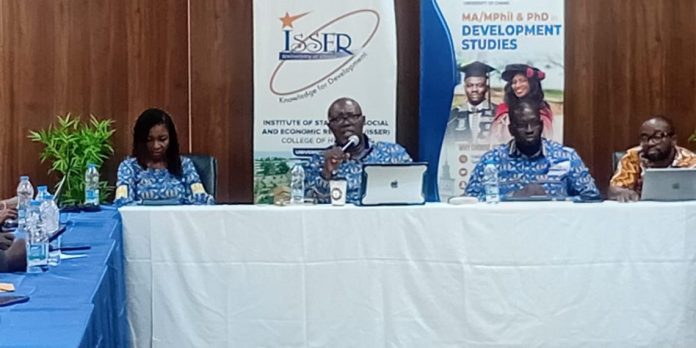The Institute of Statistical, Social and Economic Research (ISSER) has cautioned that while the government’s renegotiated power deals provide short-term relief, only deep structural reforms—not temporary savings—can stabilise Ghana’s struggling energy sector.
In the 2026 Budget, the government revealed that it had renegotiated all power purchase agreements (PPAs) with Independent Power Producers (IPPs), unlocking over US$250 million in savings and restructuring GH¢1.1 billion in energy-sector debt over the next four years.
However, ISSER warned that these measures alone do not address the sector’s long-standing structural weaknesses.
Speaking at ISSER’s Post-Budget Discussion on Wednesday, November 19, 2025, Director Prof. Robert Darko Osei highlighted Ghana’s massive losses in the power distribution chain as a key contributor to recurring debt.
“Your transmission and distribution losses are huge. Our transmission losses are around 27% or so. That is significant,” Prof. Darko Osei said.
While acknowledging improvements in commercial losses and the Electricity Company of Ghana’s (ECG) revenue performance, he stressed that these gains remain insufficient. “That is not to say that you can get away with such high transmission costs. So the ECG discussions will have to go on,” he noted.
The ISSER director argued that without a comprehensive restructuring of the power sector—particularly the distribution segment—Ghana risks returning to the same debt cycle despite IPP renegotiations.
“If we don’t get our distribution right… We’ll still negotiate with the IPPs and pay, spreading our debts over a longer period. But we’ll still have debt to pay because it will not translate to making the IPPs profitable,” he warned.
ISSER concluded that the fiscal space created by the renegotiations should be leveraged to strengthen power-sector governance, reduce technical losses, and build a sustainable pricing and planning framework capable of supporting industrial growth.
























































![[FREE FREE MONEY] Predict and Win a Guaranteed GH¢200 From Us EVERY WEEK](https://wordpress.ghanatalksradio.com/wp-content/uploads/2022/02/Predict-and-Win-Final-09-03-2021-218x150.jpg)
![[Predict & Win – 8th/Oct.] WIN A Guaranteed ¢200 From Us This Week](https://wordpress.ghanatalksradio.com/wp-content/uploads/2021/10/maxresdefault-16-218x150.jpg)
![[Predict & Win – 2nd] WIN A Guaranteed ¢200 From Us This Week](https://wordpress.ghanatalksradio.com/wp-content/uploads/2021/09/maxresdefault-50-218x150.jpg)
![[Predict & Win – 25th] WIN A Guaranteed ¢200 From Us This Week](https://wordpress.ghanatalksradio.com/wp-content/uploads/2021/09/maxresdefault-36-218x150.jpg)
![[Predict & Win – 18th] WIN A Guaranteed ¢200 From Us This Week](https://wordpress.ghanatalksradio.com/wp-content/uploads/2021/09/maxresdefault-23-218x150.jpg)









![[National cathedral] See full list of churches that have contributed since 2018](https://wordpress.ghanatalksradio.com/wp-content/uploads/2020/09/Ghana-National-Cathedral-GhanaTalksRadio-100x70.jpg)



